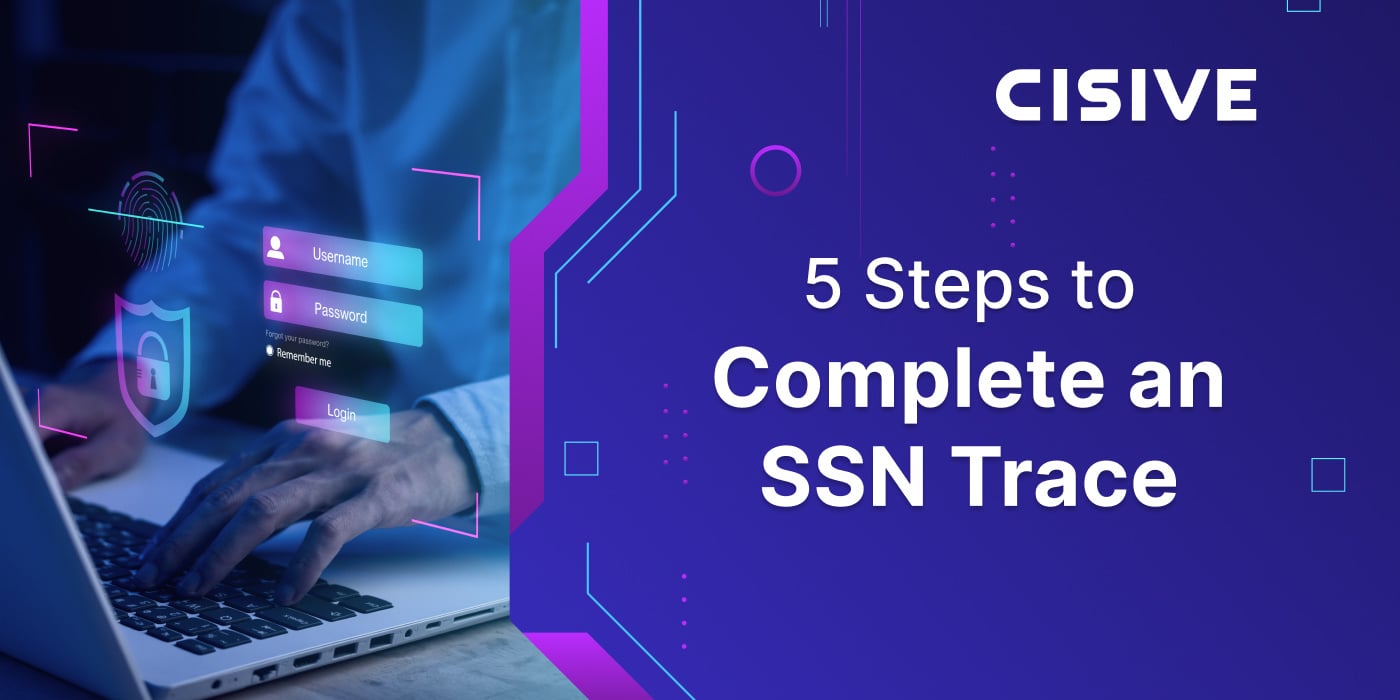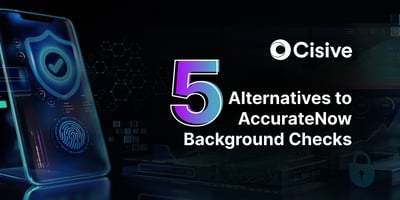

The stakes in talent intelligence are high. Failing to conduct thorough background checks on a...

Imagine the nightmare of hiring a qualified candidate only to discover they were hiding something that could potentially hurt your company. While you may ask what to do in that scenario, the more important question is, "How did this happen?"
It is not news to anyone in HR that candidates lie on their resumes. According to a recent survey, 7 in 10 workers confessed that they falsified information when applying for a job. 37% of those surveyed stated that they lied frequently — ouch!
It is not surprising that a few slightly misleading resumes make it into the hands of HR professionals. However, the real challenge for recruiters is verifying resumes and CVs in a background check. Unbelievably, there is no unified process for uncovering certain elements of a background check.
As a result, HR must grapple with gaps in address history, aliases, date of birth, employment history, credit history, and applicant fraud. This is why an SSN trace is a critical component of an employee background check. It fills the gaps.
Below, we explain what an SSN trace is and why you should include it in your hiring process.
Key TakeawaysHere are the key things you need to know about SSN traces:
|
An SSN trace identifies all of an applicant's data that is linked to a Social Security Number. It is typically the ground-level first step in a comprehensive background check. The trace searches multiple databases for an SSN. Sources may include credit card providers, schools, or lending institutions.
A trace is rarely an endgame. Instead, it is a springboard that helps you conduct a “pointer” or preliminary search on an applicant. It helps you identify potential issues or determine where to conduct in-depth searches, such as employment confirmation or a criminal background check.
During the hiring process, the recruiter secures the applicant's approval to conduct the trace. The recruiter then collects the number, submits the request, and searches the database. They analyze the results and verify the information on the application or resume. If necessary, they will report the findings to the appropriate party.
A trace is a great tool for executives, hiring managers, HR staff, and anyone recruiting or onboarding staff.

When conducting a trace, you can follow steps designed to ensure accuracy and compliance. The steps include:
Before moving forward, you must obtain written consent from the candidate. The candidate must understand that your company will use their Social Security Number to obtain personal and professional information.
You can conduct your search using your tools or resources. However, the most effective way to do a trace is through a background check provider, like Cisive, that is compliant with the Fair Credit Reporting Act (FCRA). We offer comprehensive traces and additional resources for conducting more thorough background checks.
The trace scours the entire database for the information you need. You may find past and current addresses associated with the SSN. The database also includes date of birth, alias names, such as maiden names and variations linked to the SSN.
When you find the desired information in the database, you can compare it to a candidate's resume or application. A trace is great for helping you explore the gaps in an applicant's personal or professional timeline.
Once you gather the information and verify the job application, you can share your findings with the HR department, hiring manager, or compliance officer. Highlight any discrepancies or issues you find.
Make sure the report is detailed, is clear, and complies with legal and privacy regulations. Lastly, make sure you share the information only with authorized staff.
There are four possible results during a Cisive SSN Trace:
1. Complete - Clear: A search was conducted for this candidate using the identifiers provided in a residential history Search. No record was found for the provided identifiers on the Social Security Administration (SSA) Death Master Index.
Example: Criminal searches were conducted using developed addresses associated with the subject’s commercial transactions. The social security number provided by the candidate was not in the SSA Death Master Index.
2. Complete - Review: A search was conducted for this candidate using the identifiers provided in a residential history Search. A record was found for the provided identifiers on the SSA Death Master Index.
Example: Criminal searches were conducted using developed addresses associated with the subject’s commercial transactions. The social security number provided by the candidate appeared in the SSA Death Master Index.
3. Complete - Review: No record was found for this candidate using the identifiers provided in a residential history Search. No record was found for the provided identifiers on the SSA Death Master Index.
Example: No commercial transactions were found for the social security number provided by the candidate. The social security number provided by the candidate was not in the SSA Death Master Index.
4. Complete - Review: No record was found for this candidate using the identifiers provided in a residential history Search. A record was found for the provided identifiers on the SSA Death Master Index.
Example: No commercial transactions were found for the social security number provided by the candidate. The social security number provided by the candidate appeared in the SSA Death Master Index.

As a recruiter, your primary goal is to put the right people in the right positions while protecting your company. Staving off disaster begins in the earliest stages of your hiring process. Conducting a trace can weed out candidates who engage in suspicious activity.
What follows are five key benefits to understand the importance of running SSN traces.
Some job applicants will do about anything to get their dream job, including identity theft or otherwise lying about their identity. They may use someone else’s name, falsify documents, misrepresent work history, hide a criminal record, or — you guessed it — hijack an SSN. A trace helps you verify that the applicant is who they say they are.
Note: The trace does not confirm the applicant's identity. Instead, it lays the groundwork for verifying whether everything in the database matches everything on the application. You will need to use other resources to match the SSN with the identity.
Job applicants may leave gaps in their residential timeline or show inconsistencies in their legal names.
Not all reasons are sinister. A person may omit addresses due to frequent moves, living abroad, short-term homelessness, or legitimate privacy concerns. Legal name changes could simply be due to a change in marital status. Other people, however, may move frequently or change their legal name to hide unfavorable activities or information.
A trace will not tell you why there are gaps or previous legal names. It will only confirm the information it has. You will want to discuss these gaps or names in your interview.
A candidate may have a history of fabricating or exaggerating their past qualifications, work history, or skills to appear more qualified than they are. They may have claimed educational degrees, falsified previous job titles, or used a fake name.
A trace reveals this type of fraudulent behavior. It can show if someone used multiple identities or hid their real name. By exploring addresses and aliases, you can identify suspicious activity. A trace ensures that you are hiring a legitimate candidate, not a fake one.
A trace offers a segue into a criminal background check. By providing a history of addresses linked to the SSN, your check covers all jurisdictions where the applicant has lived.
For instance, an applicant lists one address on their job application. The trace shows three previous addresses in other states. This could indicate that the applicant has an undisclosed criminal history. They may be clean in one state but have a criminal record in another.
Regardless of what industry you work in, you must maintain a safe professional environment. There are security, compliance, communication, and confidentiality issues to think about. You must maintain a work culture that protects your employees and customers.
A trace helps you hire people you can trust to perform a role with professionalism and discretion. You can feel confident that the person you add to the team has your company's and your customer's well-being in mind.
A trace helps you hire competent people, too. You need to be sure that they are who they say they are, they can do what they claim they can do, and they have the proper skills and credentials for the job.
You can perform a trace in two ways: DIY (do it yourself) or using a background check provider.
Choosing Cisive is the best option because we do the searching for you. We give you a complete applicant profile so you can make smarter decisions during the hiring process.
Since candidates are not legally required to provide an SSN, they may feel uncomfortable giving it to you. Cisive gives applicants more confidence that their information will be secure and confidential. The applicant will receive a written notification and agree to the trace before we move forward.
Our process is simple:
Our database is extensive, and all of the information comes from first-hand government agencies. As a result, you get accurate, up-to-date reports. What do our SSN traces and background checks include?
Cisive has an impressive 99.9994% check rate. The information we provide is extremely accurate, with very few gaps or errors. Our network puts us in touch with the most current information available for any job applicant. We're especially effective in high-security industries such as healthcare, transportation, financial services, technology, and business.
We also provide a fully customizable trace and background screening service. Tell us what information you're looking for, and we'll fine-tune the search based on your needs. You choose which tools or searches apply to your business. Meet with one of our experts who can help you with employee screening.
Hiring the most qualified candidate involves more than collecting resumes listing the right skill sets. It's also about hiring decisions that impact your organization's safety. An SSN trace report helps you identify fraud and suspicious activity to avoid recruiting the wrong people.
Cisive's background screening platform offers an expansive database, useful tools, and customizable searches. Check out our products and services and contact us to speak to an expert. Get started with our software solutions today.

The stakes in talent intelligence are high. Failing to conduct thorough background checks on a...
%20Verification%20-%20BLOG.png?height=200&name=BLOG_%20How%20to%20Streamline%20Social%20Security%20Number%20(SSN)%20Verification%20-%20BLOG.png)
Social Security number (SSN) verification is a critical process for employers looking to maintain...

AccurateNow is a popular background check software used by companies of all sizes. It’s known for...